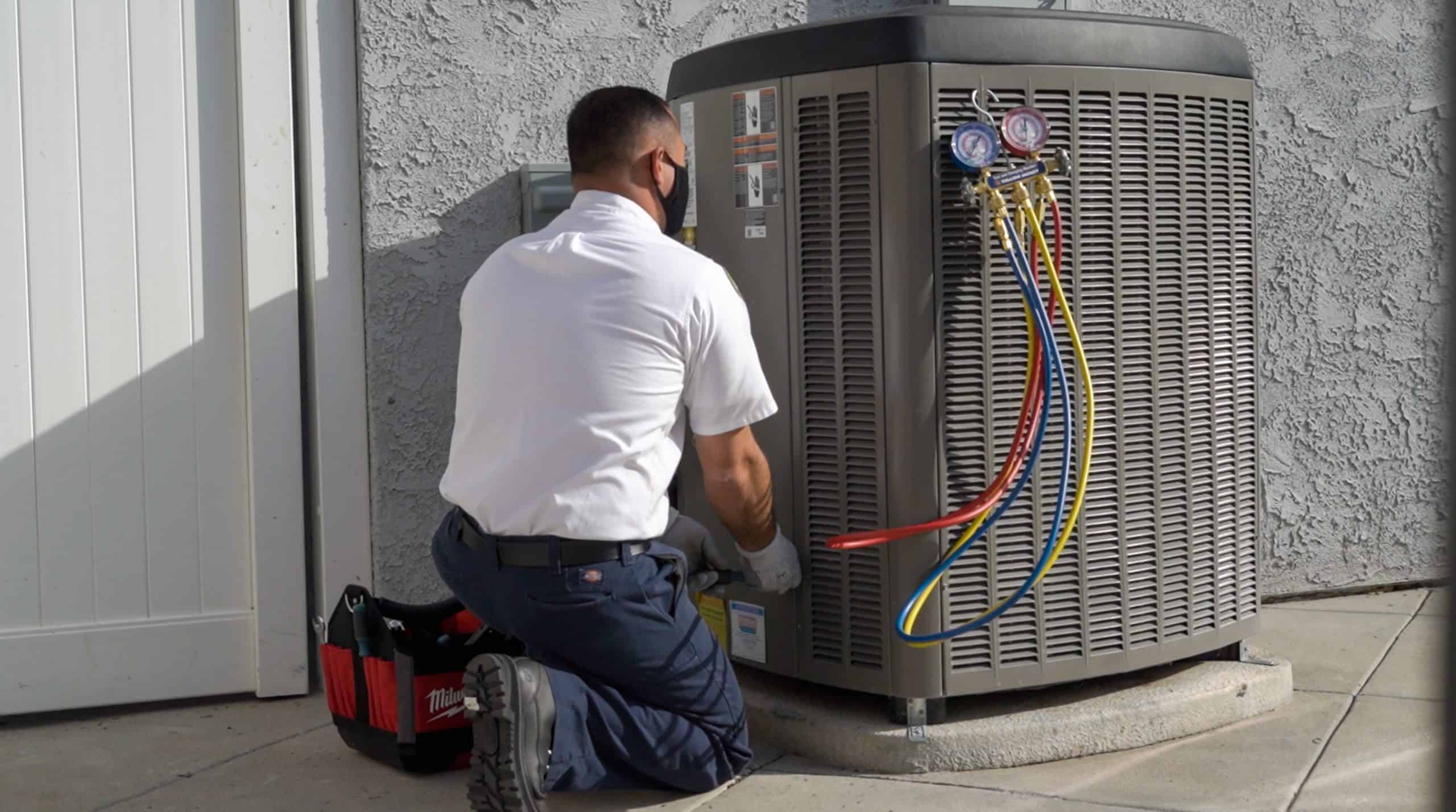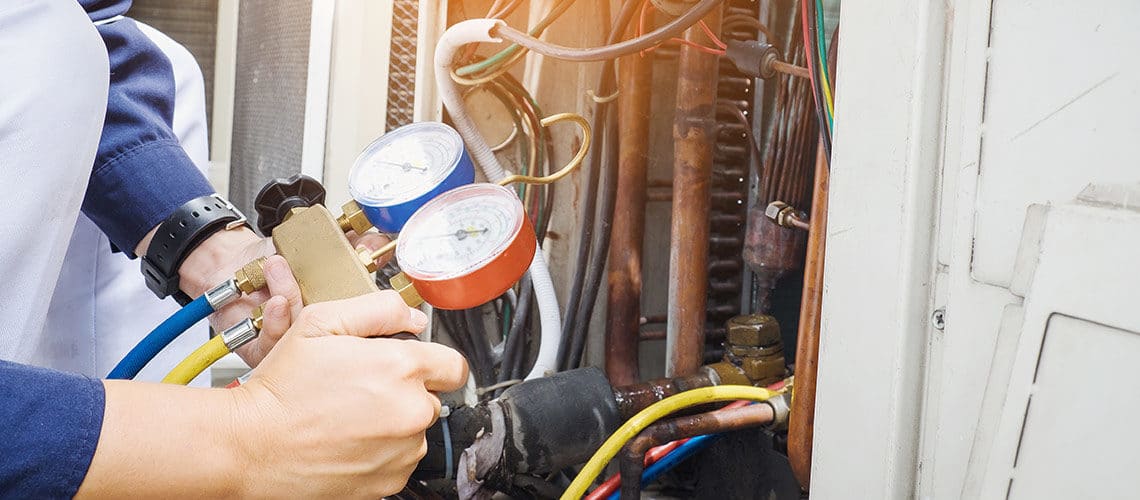Trust DMAKS HVAC for Expert Heating and Cooling Services.
Trust DMAKS HVAC for Expert Heating and Cooling Services.
Blog Article
Just How to Pick the Right A/c System for Your Demands
Choosing the ideal heating and cooling system is a crucial decision that calls for careful consideration of various factors. Begin by examining your home's size, design, and special needs, as these aspects determine the needed ability and setup of the system. Furthermore, developing a budget that encompasses setup and long-lasting operational costs is necessary. As you weigh your choices, understanding power efficiency rankings and the ramifications of your local environment will certainly play a significant duty in your selection. The myriad of system kinds available can complicate this procedure, leading one to wonder which path eventually leads to ideal comfort and efficiency.
Analyze Your Home Dimension
Examining your home dimension is an essential initial step in selecting the proper A/c system. An A/c system that is as well tiny will have a hard time to maintain comfy temperature levels, leading to boosted power consumption and wear on the unit.
To precisely analyze your home size, determine the square footage of each space, taking into consideration variables such as ceiling height and the design. Additionally, take into consideration the insulation top quality and the number of windows, as these elements affect thermal efficiency. Residences with open flooring strategies might need various system configurations compared to those with several separated areas.
Making Use Of the Guidebook J load computation technique can offer a more precise price quote of your cooling and heating needs. This approach represent various variables, including regional environment, solar gain, and tenancy patterns. By carefully examining these aspects, you can make certain that your picked a/c system is properly sized, causing enhanced comfort, energy efficiency, and long life of the equipment.
Determine Your Spending Plan
Determining your spending plan is a critical action in the heating and cooling system choice process, as it establishes the criteria for your options - DMAKS HVAC. A cooling and heating system is a considerable investment, and understanding your monetary restrictions will help tighten down selections that fit within your methods
Begin by assessing not just the preliminary purchase cost but likewise installation prices, which can differ dramatically depending on the complexity of the job. Furthermore, take into consideration ongoing expenditures such as upkeep, fixings, and power usage. A system may appear budget-friendly at first yet can lead to higher expenses in time if it is much less effective.
It is recommended to allocate a contingency fund for unexpected expenses that may arise during installation or preliminary system modifications (DMAKS HVAC). Additionally, discover financing alternatives or discounts that might be offered, as these can relieve the concern of in advance prices
Ultimately, having a clear budget plan permits you to engage with a/c professionals much more efficiently, ensuring you receive customized advice that lines up with your financial goals and home requirements. By being attentive about your budget plan, you can make enlightened choices that improve comfort without jeopardizing financial security.
Evaluate Power Efficiency
Power efficiency plays an important duty in the general efficiency and cost-effectiveness of your HVAC system. Look for systems with a high Seasonal Energy Effectiveness Ratio (SEER) for cooling and a high Annual Fuel Utilization Efficiency (AFUE) rating for home heating.
In addition, take into consideration the Power Star accreditation, which signifies that the system meets rigorous efficiency standards established by the Environmental Defense Firm. Buying a Power Star-rated heating and cooling system can lead to substantial cost savings over time, particularly in areas with severe temperature level fluctuations.
One more element to assess is the system's size and capacity. An extra-large or small system can bring about inefficiency and enhanced energy prices. DMAKS HVAC. Correct sizing, typically determined via a Hands-on J load estimation, ensures that the system operates at ideal effectiveness


Take Into Consideration Climate and Setting
When choosing a cooling and heating system, it is critical to think about the local environment and ecological problems, as these factors substantially affect the system's efficiency and Related Site effectiveness. Various areas experience varying temperature level extremes, moisture levels, and seasonal changes, every one of which impact heating and cooling down needs.

Additionally, neighborhood ecological factors, such as air top quality and possible irritants, need to educate your selection. Equipments outfitted with advanced filtration innovations can aid minimize toxins and give cleaner air. Furthermore, consider the energy sources readily available in your area-- some a/c systems are much more reliable when powered by gas or renewable power resources.
Inevitably, straightening your cooling and heating system option with your local climate and ecological factors to consider will result in improved convenience, improved efficiency, and lower power costs.
Explore System Kind and Features
As home owners seek to optimize convenience and efficiency, exploring the different types of a/c systems and their special functions comes to be essential. The primary kinds of heating and cooling systems consist of central air conditioning, heatpump, ductless mini-split systems, and heaters. Each system provides distinct benefits tailored to different needs and preferences.
Central air conditioning systems offer uniform cooling throughout a home, making them excellent for larger rooms. Warmth pumps work as both home heating and cooling solutions, making use of power to transfer warm, which can lead to lower power costs. Ductless mini-split systems are becoming significantly popular because of their flexibility and ease of installment, permitting homeowners to regulate the temperature in individual rooms without comprehensive ductwork.

Conclusion
To conclude, selecting the ideal cooling and heating system demands mindful factor to consider of numerous factors, consisting of home size, budget plan constraints, energy performance, local climate, and offered system kinds. A detailed analysis of these components ensures optimal convenience and cost-effectiveness. By adhering to an organized approach, house owners can make informed decisions that line More Help up with their details needs and choices, eventually bring about improved interior air quality and energy cost helpful resources savings.
Report this page